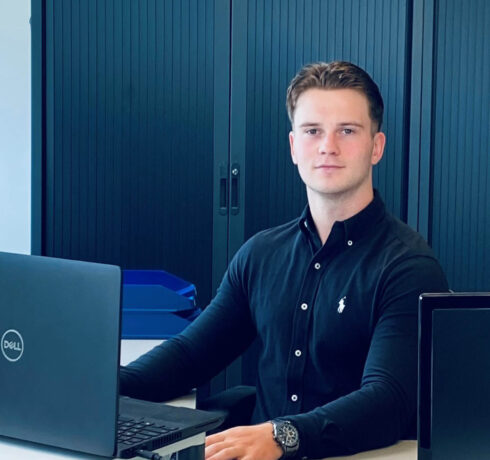He is only 21 and already knows everything about the import and export of, primarily, marine diesel engine parts. Nino de Jonge is freight forwarder and customs broker at Maritime Logistics BV (ML). Since 2008, ML has been the logistics service provider for Damen Schelde Marine Services (DSMS), the international wholesaler in components for marine diesel engines. “It’s a very nice job with lots of variety,” says Nino. DSMS receives thousands of orders per year, of which one in ten requires customs paperwork. ML handles the whole import/export process and even has a customs warehouse, where products ordered from non-EU countries are temporarily stored without paying import duties.
Nino joined the DSMS Forwarding Department in 2017. He started as a so-called ‘BBL’ student, working four days a week and attending school one day a week. After obtaining his Logistics Supervisor diploma, he continued studying for his Bachelor’s in Logistics Management. “ML imports a lot of products from Asia to Vlissingen. And DSMS has had its own sales office in Singapore for years,” adds Nino. “In addition, ML also has warehouses in Shanghai and Busan. Because of these various warehouse locations we can provide quick deliveries to our customers, although this does require some organisation.”
“We prepare the necessary documents for all this here in Vlissingen. ML would also like to offer its services to other companies within the Damen Shipyards Group. We already do that for Damen Yachting – Amels – taking care of their import and export shipments on a weekly basis. We hope to spark the interest of other Dutch maritime parts companies for our services as well.” Besides import and export, ML also calculates the costs of spare parts transport. The parts that are imported from Asia travel thousands of kilometres, often by ship or plane. Recently, DSMS transported a load from China by train for the first time.
“An outsider might think that it is simply ordering and sending parts, but of course there is much more to it than that. That’s what makes it so interesting.” Nino de Jonge
It was a shipment of cylinder liners. “They put a container on the train and this was transported via Russia. Actually, this went very well. We might do this more often in the future,” says Nino. “Air freight only takes a few days but it is expensive; transport by ship is cheaper but can take up to forty days. This alternative by train is a good interim solution, because the cargo arrives within a fortnight. And it is sustainable too.” Nino likes the diversity of his job. “An outsider might think that it is simply ordering and sending parts, but of course there is much more to it than that. That’s what makes it so interesting.”

